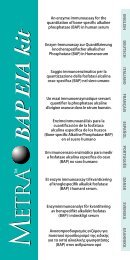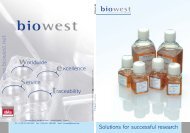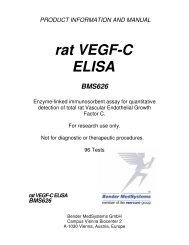Create successful ePaper yourself
Turn your PDF publications into a flip-book with our unique Google optimized e-Paper software.
PANSERIN TM 416<br />
PANSERIN TM 416 is a serumfree medium (basic medium) which is, after supplementation of growth<br />
factors, suitable for the production of dendritic cells.<br />
Dendritic cells are highly specialized antigen-presenting cells and can initiate and regulate antigenspecific<br />
immunoresponses. This ability can be used in order to generate immunoresponses against<br />
certain proteins of tumour cells and thus to fight against tumours with the immune system. Dendritic<br />
cells have been isolated from a great variety of non-lymphatic and lymphatic tissue of human<br />
beings, mice and other species.<br />
For the generation of tumour vaccines, dendritic cells can be produced from the peripheral blood<br />
of tumour patients. In clinical studies the principal effectiveness of a vaccination with dendritic<br />
cells has been shown.<br />
Antigen Uptake:<br />
In almost any tissue of the body, dendritic cells form a dense network of guardian cells that take<br />
up extracellular components by processes such as phagocytosis and endocytosis and thus analyse<br />
their environment. Proteins that have been taken up undergo an intracellular decomposition into<br />
peptides, are bound to MHC-molecules and transported to the cell surface. Thus antigenic<br />
determinants of the peptides are made recognizable to T-cells. Within the scope of the physiological<br />
cell regeneration dendritic cells leave the peripheral tissue and migrate with the lymph into a<br />
regional lymph node where they interact with T-cells. From an intact tissue dendritic cells reach<br />
the lymph node in unactivated condition.<br />
A functioning monitoring system excels in the ability to quickly and specifically recognize damaging<br />
processes and to take suitable steps against them. For this purpose, dendritic cells carry receptors<br />
on their surface for a variety of danger signals which can be radiated from microorganisms,<br />
mediators inherent in the body or activated T-cells. Examples for microbial structures activating<br />
dendritic cells are lipopolysaccharides of Gram-negative bacteria, cytidine guanosine dinucleotide<br />
(cpG) – rich bacterial DNA and viral doublestranded RNA. Endogenous mediators, for which dendritic<br />
cells have special receptors and which send an activating signal, are cytokines, prostanoids and<br />
adenine nucleotides. Activated T-cells can stimulate dendritic cells by means of the CD40-ligand<br />
integrated in their cell membrane. The activation of these different receptors induces essential<br />
cell changes which are summarized by the term maturation. The ability of phagocytosis gets lost.<br />
Peptides bound to MHC-molecules are presented in a higher density and with greater stability. The<br />
cytoskeleton structure is reorganized and a changed expression of chemokine receptors enables<br />
the dendritic cells to get from the focus of inflammation into the draining lymph node. Co-stimulating<br />
molecules on the surface of dendritic cells and the release of cytokines, e.g. interleukin-12, finally<br />
allow the dendritic cells an efficient interaction with T-cells.<br />
Induction of an Immunoresponse:<br />
In the lymph node, dendritic cells interact with various lymphocyte populations. Above all T-cells,<br />
which haven’t yed had any antigen contact, feel the cell surface of dendritic cells and are activated<br />
if the T-cell receptor recognizes the presented antigen. This central process for the acquired (antigenspecific)<br />
immunoresponse is called “Priming”. Cytotoxic T-cells develop from CD8 cells and these<br />
cytotoxic T-cells are able to kill those cells which they recognize with their T-cell receptor.<br />
BIOTECH GmbH<br />
<br />
The company<br />
Am Gewerbepark 13, D-94501 Aidenbach<br />
phone +49 (0) 85 43 - 60 16-30, fax +49 (0) 85 43 - 60 16-49<br />
e-mail: info@pan-biotech.de, http://www.pan-biotech.de<br />
13



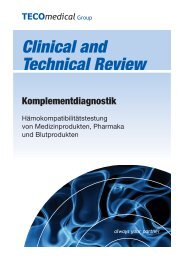
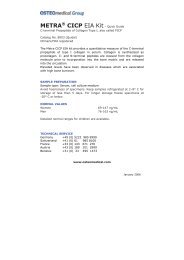
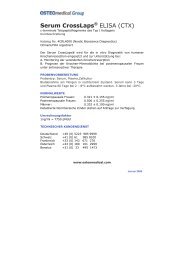
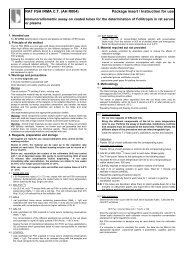
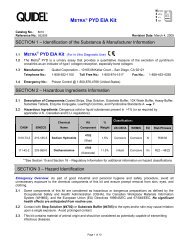

![PTH [Hormone Parathyroïdienne] Intacte ELISA](https://img.yumpu.com/1233682/1/190x245/pth-hormone-parathyroidienne-intacte-elisa.jpg?quality=85)
